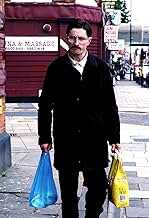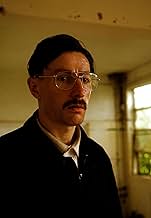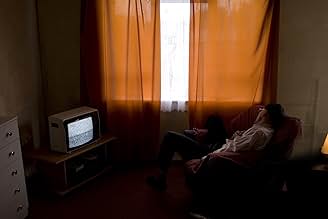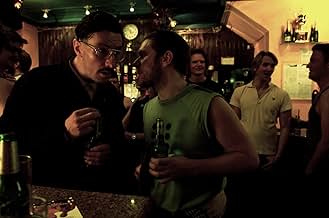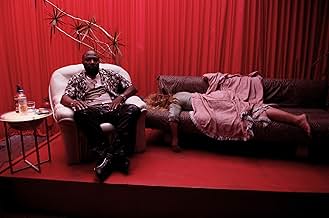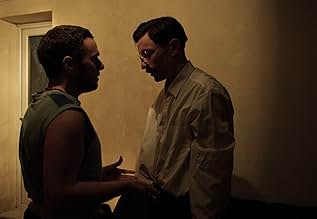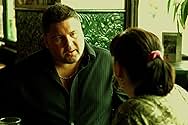AVALIAÇÃO DA IMDb
6,1/10
3,8 mil
SUA AVALIAÇÃO
Adicionar um enredo no seu idiomaA thriller centered on a serial killer in a rundown London suburb.A thriller centered on a serial killer in a rundown London suburb.A thriller centered on a serial killer in a rundown London suburb.
- Prêmios
- 1 vitória no total
Avaliações em destaque
Tony watches action films on video cassette. He lives alone in a vertical street; a tower block in run down Dalston, a suburb of 'Broken Britain's' North London. Tony has not worked for over thirty years, and has no wish to do so. After all, he does have so much to do at home. This is at least what Tony tells his job centre adviser. This scene happens around the middle of the film, where we have already discovered that Tony has a penchant for murdering people in his flat. In protracted sequences throughout the film, we see Tony rigorously separate the body parts into their smallest components; wrapping them in newspaper and placed in corner-shop blue plastic bags for disposal. Whenever we follow Tony as he walks the streets, he is always carrying blue plastic bags. Tony has a lot of body parts to dump in the Thames.
Gerard Johnson's feature debut is a gritty serial killer movie, - clearly inspired by real-life British serial killer, Dennis Nilson (the Muswell Hill Murderer) - that follows a man completely alienated from his surroundings. He is Nilson in the early 1980's. He only watches action videos from that decade. Like Nilson, Tony (played with all the sweaty awkwardness needed for the character, by Peter Ferdinando) prefers to keep the bodies for company. He talks to them as they are placed on the sofa, or laid out in bed. Tony's life is a cycle of seconds of murder; hours of company; much time dismembering; and a long, perpetual task of bit-by-bit disposal.
Tony picks up men in gay bars. He persuades a couple of smack-heads to go back to his flat. A boy of 10 years goes missing on the estate. A large, stereotypical, aggressive working-class man targets Tony as an obvious target: His appearance could resemble that Daily Mirror image of the bespectacled, moustachiod loner, that so associated with a pederast.
Despite the grim, and inescapable bleakness of the film, director Johnson, finds room to add humour. The film resembles, stylistically, that of John McNaughton's excellently unresolved Henry: Portrait of a Serial Killer (1986). The same concept carries into this film. The life- goes-on attitude. Tony is a ghost in the narrative. Yes, he is the protagonist. But he only exists in his insular world. The space he has dwelt in for "ages". Outside he drifts through the busy streets unnoticed; he fades into obscurity amongst regular people. Anonymously carrying plastic bags of internal organs.
The film is self consciously 1970's in its approach; both stylistically, and thematically. in the latter of those two, '70's horror cinema tended to the ambiguity left by rare conclusions. For the first, this is low budget cinema. However, this is certainly made with style; it is highly competent filmmaking. We know immediately from the start of the film that the filmmakers influences in the golden-years-of-exploitation- cinema are a part of this picture; the typeface of the movie title 'Tony' are reminiscent of the title cards for the American exploitationers this really wants to homage. It is an incredibly well made contribution to the likes of Jeff Gillen and Allan Ormsby's Deranged (1974). However, Tony does not highlight the grotesque, like in much of the films it might be 'riffing' on.
Johnson's film looks like it could possibly fit into the working-class visuals of a kitchen sink drama - only through the eyes of a cold- hearted killer. Although, whilst we are repelled by Tony, do we also feel pathos for a character so out of touch with the world, that he will try and persuade a Chinese man selling DVDs on the street to sell him outmoded video cassettes? Tony is entirely disenfranchised. Because of this separation from reality, Tony is able to pass unseen. Or perhaps, like Mary Harron's American Psycho (2000), this is all imagined. (By the way, I don't believe at all that this was all imagined; that's just how I ended it.)
www.the-wrath-of-blog.blogspot.com
Gerard Johnson's feature debut is a gritty serial killer movie, - clearly inspired by real-life British serial killer, Dennis Nilson (the Muswell Hill Murderer) - that follows a man completely alienated from his surroundings. He is Nilson in the early 1980's. He only watches action videos from that decade. Like Nilson, Tony (played with all the sweaty awkwardness needed for the character, by Peter Ferdinando) prefers to keep the bodies for company. He talks to them as they are placed on the sofa, or laid out in bed. Tony's life is a cycle of seconds of murder; hours of company; much time dismembering; and a long, perpetual task of bit-by-bit disposal.
Tony picks up men in gay bars. He persuades a couple of smack-heads to go back to his flat. A boy of 10 years goes missing on the estate. A large, stereotypical, aggressive working-class man targets Tony as an obvious target: His appearance could resemble that Daily Mirror image of the bespectacled, moustachiod loner, that so associated with a pederast.
Despite the grim, and inescapable bleakness of the film, director Johnson, finds room to add humour. The film resembles, stylistically, that of John McNaughton's excellently unresolved Henry: Portrait of a Serial Killer (1986). The same concept carries into this film. The life- goes-on attitude. Tony is a ghost in the narrative. Yes, he is the protagonist. But he only exists in his insular world. The space he has dwelt in for "ages". Outside he drifts through the busy streets unnoticed; he fades into obscurity amongst regular people. Anonymously carrying plastic bags of internal organs.
The film is self consciously 1970's in its approach; both stylistically, and thematically. in the latter of those two, '70's horror cinema tended to the ambiguity left by rare conclusions. For the first, this is low budget cinema. However, this is certainly made with style; it is highly competent filmmaking. We know immediately from the start of the film that the filmmakers influences in the golden-years-of-exploitation- cinema are a part of this picture; the typeface of the movie title 'Tony' are reminiscent of the title cards for the American exploitationers this really wants to homage. It is an incredibly well made contribution to the likes of Jeff Gillen and Allan Ormsby's Deranged (1974). However, Tony does not highlight the grotesque, like in much of the films it might be 'riffing' on.
Johnson's film looks like it could possibly fit into the working-class visuals of a kitchen sink drama - only through the eyes of a cold- hearted killer. Although, whilst we are repelled by Tony, do we also feel pathos for a character so out of touch with the world, that he will try and persuade a Chinese man selling DVDs on the street to sell him outmoded video cassettes? Tony is entirely disenfranchised. Because of this separation from reality, Tony is able to pass unseen. Or perhaps, like Mary Harron's American Psycho (2000), this is all imagined. (By the way, I don't believe at all that this was all imagined; that's just how I ended it.)
www.the-wrath-of-blog.blogspot.com
In Tony, the title character (played very convincingly by Peter Ferdinando) is a soft-spoken, middle-aged nerd who enjoys old action movies. He's severely withdrawn from the world, unable to speak or relate to others, and has never worked a job in his life. One other important fact about Tony is his penchant for murder. In fact, Tony murders on a regular basis, whether it's druggies, men he picks up at gay bars, etc. At a mere 75 minutes, Tony never strives to be complex or hard to follow, but instead a simple portrayal of a simple killer who inability to connect with the world causes him to outburst so easily on those who confuse or anger him. When a young boy goes missing in town, the father immediately assumes it's Tony's doing and we watch as everything in Tony's life comes dangerously close to unfolding. Like I said, the film is simple yet sophisticated enough to be enjoyed mostly by the smarter movie watcher. Those looking for quick release won't get it here at all, despite the film's overly short runtime. A lot have compared it to the English answer to American classic Henry; Portrait of a Serial Killer and I couldn't agree more. It's dark, gritty, and covered in gloom, yet you somehow feel for this monstrous character. Overall, Tony is an excellent watch, one of the better "horror" films I've seen this year. Good film.
Tony is a look at a serial killer and their everyday life. Tony is awkward, very awkward, and this leads to him being ignored or mistreated by the majority of people. Tony manages to gather sympathy throughout the film as he just so happens to encounter a lot of scummy, horrible people. These people generate no sympathy for themselves, but not in a bad way. The film seems to suggest that we should all just be decent human beings. There's no harm in saying "hello" or having rational discussions. It's the hate and negativity aimed at Tony that fuels his actions. Peter Ferdinando gives a brilliant performance and carries Tony, realistically, through a wide range of scenarios, from unprovoked arguments, to awkward job interviews. A little, but well executed film.
This is a fantastic film. Well shot, well written, well edited, well acted,effective soundtrack...and short enough to leave you wanting more.
I cant say enough good about this film, as its one of those films that is so good that it takes on a life of its own. As all great art, this is not a 'horror film' but a sociological reflection of our times.
The story introduces us to a lonely man who lives by himself and tries to form relationships with the vagrants and oddball characters but due to his inability to communicate properly, which we read into as shyness, years of repression, denial he ends up killing them.
Humour is used as a temporary escape valve from the horror we see, and actually, the comedy is a real highlight of this dark piece, as we are challenged to laugh at the absurdity of the situation. This is nothing new, but it added to the humanity of the piece.
To be honest, there are a few things that I have to criticize for this piece but these more loving embellishments than anything else. For example, the film could be longer as we are left hanging at the end and wanting more.without giving the game away, if tony had succeeded in his goals, and then given due punishment, it would have created the next layer of depth that the film is surely deserving.Also small symbolic indicators, without being too blatant would have added to revealing his past, that even if the film chose not to express, could add clues hinting at the person that Tony once was.Also could have done some scenes of him eating alone.
However with respect to the directors artistic choices, I believe leaving certain issues unresolved allows the viewer to imagine and ponder more about an epidemic that wont go away, provoking deeper contemplation. So in this respect, it is an intelligent artistic decision which is in hindsight, to be respected.
Like i said, great films are the ones that have a life of their own, not dictated by comparisons although comparisons are necessary to explain them, once you see the film, it goes far beyond that. this is a character study of a creature in pain. A product of its environment and even a sociological reflection of the dysfunction of its environment. As all good art does, makes us reflect and think in the here and now. And what we as people, society , generation, have become. Definitive stuff.
I cant say enough good about this film, as its one of those films that is so good that it takes on a life of its own. As all great art, this is not a 'horror film' but a sociological reflection of our times.
The story introduces us to a lonely man who lives by himself and tries to form relationships with the vagrants and oddball characters but due to his inability to communicate properly, which we read into as shyness, years of repression, denial he ends up killing them.
Humour is used as a temporary escape valve from the horror we see, and actually, the comedy is a real highlight of this dark piece, as we are challenged to laugh at the absurdity of the situation. This is nothing new, but it added to the humanity of the piece.
To be honest, there are a few things that I have to criticize for this piece but these more loving embellishments than anything else. For example, the film could be longer as we are left hanging at the end and wanting more.without giving the game away, if tony had succeeded in his goals, and then given due punishment, it would have created the next layer of depth that the film is surely deserving.Also small symbolic indicators, without being too blatant would have added to revealing his past, that even if the film chose not to express, could add clues hinting at the person that Tony once was.Also could have done some scenes of him eating alone.
However with respect to the directors artistic choices, I believe leaving certain issues unresolved allows the viewer to imagine and ponder more about an epidemic that wont go away, provoking deeper contemplation. So in this respect, it is an intelligent artistic decision which is in hindsight, to be respected.
Like i said, great films are the ones that have a life of their own, not dictated by comparisons although comparisons are necessary to explain them, once you see the film, it goes far beyond that. this is a character study of a creature in pain. A product of its environment and even a sociological reflection of the dysfunction of its environment. As all good art does, makes us reflect and think in the here and now. And what we as people, society , generation, have become. Definitive stuff.
This film literally just drops you into Tony's life and then drops you right back out again. The fact that i was so desperate for more is a good sign that what I did see was great. And the ending itself was quite well done with a great piece of music that, with what had come before, had deeper meaning for me - in other words it made my skin crawl. Which again, is a good thing !
I am assessing by its very simple decor, locations and shots that this was quite low budget which is a credit to the film-makers, actors and script writers. The story is completely focused on the life of a man named Tony. One could describe him as a loner, depressed, socially awkward and well...passive. As we get to see Tony though we come to the conclusion that he is more than f#@ked up and has crossed the 'weird psychopath' line well and truly.
I mean the guy has a Paul Young cassette for Christ sake!!!
The movie hinges on tony, a mild, meek guy, actually being a serial killer that like some real life serial killers (Nielsen, Dahmer) seems to crave company and not to be socially rejected. There is clear connection to the mentioned real life killers in Tony as he attends gay bars and only seems to kill men. Though Tony has a life and identity of his own and for the brief time I did get to follow him i was into it.
Those seeking blood, guts, gore, action, jump scares forget it. Tony is a character study which lingers artistically and builds a layer of dread throughout instead of shoving everything in a sleek, fast edited production.
I am assessing by its very simple decor, locations and shots that this was quite low budget which is a credit to the film-makers, actors and script writers. The story is completely focused on the life of a man named Tony. One could describe him as a loner, depressed, socially awkward and well...passive. As we get to see Tony though we come to the conclusion that he is more than f#@ked up and has crossed the 'weird psychopath' line well and truly.
I mean the guy has a Paul Young cassette for Christ sake!!!
The movie hinges on tony, a mild, meek guy, actually being a serial killer that like some real life serial killers (Nielsen, Dahmer) seems to crave company and not to be socially rejected. There is clear connection to the mentioned real life killers in Tony as he attends gay bars and only seems to kill men. Though Tony has a life and identity of his own and for the brief time I did get to follow him i was into it.
Those seeking blood, guts, gore, action, jump scares forget it. Tony is a character study which lingers artistically and builds a layer of dread throughout instead of shoving everything in a sleek, fast edited production.
Você sabia?
- CuriosidadesNone of the cast members were told anything about this film outside of their scenes with Tony.
- ConexõesReferences O Falcão Maltês (1941)
Principais escolhas
Faça login para avaliar e ver a lista de recomendações personalizadas
- How long is Tony?Fornecido pela Alexa
Detalhes
- Data de lançamento
- País de origem
- Centrais de atendimento oficiais
- Idioma
- Também conhecido como
- Tony: London Serial Killer
- Locações de filme
- Empresas de produção
- Consulte mais créditos da empresa na IMDbPro
- Tempo de duração1 hora 16 minutos
- Cor
- Proporção
- 1.85 : 1
Contribua para esta página
Sugerir uma alteração ou adicionar conteúdo ausente



